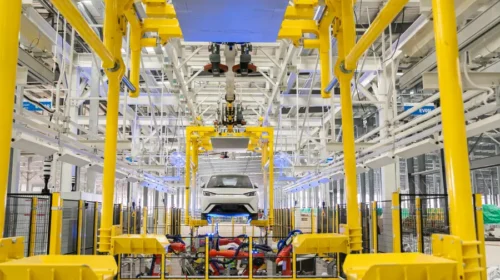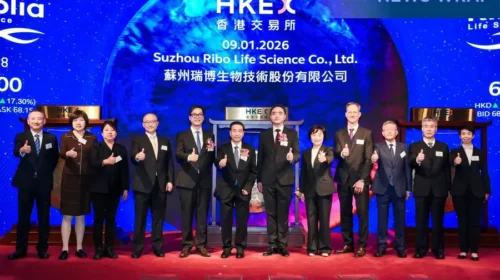China’s leading EV maker unveiled plans to bring its cars to Germany, even as talks between China and the EU to head off European EV tariffs remain deadlocked
Key Takeaways:
- BYD plans to roll out its EVs in Germany at prices ranging between 25,000 euros and 30,000 euros
- The company’s cars are subject to a 17% protective tariff under a regime introduced by the EU in response to what it calls unfair state support for Chinese EVs
By Lee Shih Ta
What, me worry? That seems to be the attitude these days at leading Chinese electric vehicle (EV) maker BYD Co. Ltd. (002594.SH; 1211.HK), which is cruising ahead into Europe despite the anti-dumping tariffs levied against its cars by the EU. The company has revealed a European roadmap that includes a drive through in Germany, as China and the European Commission remain deadlocked in ongoing talks to reach a deal that would end the tariffs.
The EU began investigating Chinese EVs last October over allegations of unfair state support and announced its results in mid-June. It later imposed provisional tariffs on Chinese EVs ranging from 7.8% to 35.3% on top of an existing 10% tax on all cars imported into the market. The additional anti-dumping tariffs were officially approved by the European Commission after a vote early this month.
The Commission points out that market share of Chinese EVs registered in the EU jumped from just 3.5% in 2020 to 27.2% in the second quarter of 2024.
The haggling has been nearly nonstop, with Beijing threatening its own anti-dumping tariffs on European goods, including dairy products, pork and brandy, even as negotiations to head off the EV tariffs continued. Chinese state media have also criticized the EU for attempting to reach deals with individual Chinese EV makers, saying such actions will disrupt bilateral talks between Beijing and Brussels.
Earlier reports said the Chinese side proposed setting a minimum price of 30,000 euros ($32,528) for Chinese EVs sold in the EU, which EU negotiators rejected.
Who picks up the extra costs?
BYD’s confidence in moving ahead despite the tariff threat may owe at least partly to its belief that it enjoys relatively good relations with the powerful European Commission.
The company was reportedly one of the most cooperative with the Commission during its investigation, and as a result was given a tariff rate of just 17%, one of the lowest among all the Chinese companies. By comparison, the Commission imposed an 18.8% tariff rate on privately owned Geely, and socked the uncooperative state-owned SAIC (600104.SH), whose China joint venture partners include Volkswagen and GM, with the highest rate of 35.3%. Despite getting the lower rate, BYD has still been quite outspoken in denouncing the tariffs.
BYD executive vice president Stella Li told Reuters in an interview at the Paris Motor Show last week that “Politicians should stay away from tariffs, otherwise adding more cost to auto manufacturing and confusing the auto industry.” She said that the company had not decided yet whether to pass the cost on to consumers.
She also told German media during the show that BYD was planning to roll out EV models in Germany at a price range of 25,000 euros to 30,000 euros. She said that Chinese EVs were “very competitive” in the European market. “European manufacturers are shying away from competition,” she said, adding the EU was unwilling to compromise on the tariffs.
“Car manufacturers all across the world should participate in this race. Those that hesitate or get cold feet will fail,” she said.
Big Chinese subsidies
Such rhetoric may sound good from the Chinese perspective, but Europe doesn’t quite see things that way.
According to a report from Germany’s Kiel Institute, BYD received 220 million euros in Chinese government subsidies in 2020 alone, equivalent to around 1.1% of its annual revenue, and the number surged nearly tenfold to 2.1 billion euros in 2022. In addition to direct government subsidies to the company itself, BYD also benefits from government subsidies for Chinese consumers who buy its EVs.
In 2015, the municipal government of Shenzhen set up an EV fund loaded with 5 billion yuan ($703 million) and mandated local taxi and bus companies to maintain a certain percentage of EVs in their fleets. As the hometown champion, BYD was naturally a major beneficiary of the plan. The company’s Chairman Wang Chuanfu was full of praise for his hometown government’s nurturing and said that “BYD’s success owed a great deal to the support of the Shenzhen government”.
That support, combined with its own expertise, have helped build BYD into the biggest car brand in China.
According to its latest financial report, BYD generated 13.63 billion yuan in profits in the first half of the year, up 24.4% from the 10.95 billion yuan during a year earlier. The report also shows the company’s revenue classified as “other income” for the six-month period more than doubled to 4.82 billion yuan from 1.86 billion yuan a year earlier. According to a financial report published by the Shenzhen Stock Exchange, the “other income” in BYD’s latest report included 3.27 billion yuan in “government subsidies relating to daily activities,” while the figure in the year-ago period was 1.78 billion yuan. BYD’s performance looks far less impressive after those subsidies are excluded.
Facing cutthroat competition at home, it’s no surprise that BYD and its peers are charging full speed ahead to sell their EVs overseas. BYD has said its goal is to get half of its total sales from exports. Its overseas sales totaled 270,000 units in the first seven months of this year and it is on track to reach 500,000 units for the whole year. Still, exports would account for just 15% of total sales if it reaches that level.
Stella Li told Reuters that BYD was planning to produce auto parts in Europe and assemble battery systems in Hungary and Turkey using cells imported from China. In August 2024, it acquired the German auto distributor Hedin Electric Mobility to better control its sales in Germany. To improve its overseas profile, the company has entered into an agreement to add 100,000 of its EVs into ride-sharing giant Uber’s fleet and will also sponsor soccer events in the U.S. and Europe.
As its European supply chains gradually take shape, BYD seems fairly confident about its future in Europe regardless of whether it has to pay extra tariffs. The company believes it will take six months or less to convince German consumers, and that its cars will soon be seen on the streets of Germany.
To subscribe to Bamboo Works free weekly newsletter, click here






